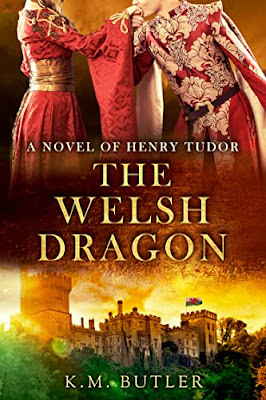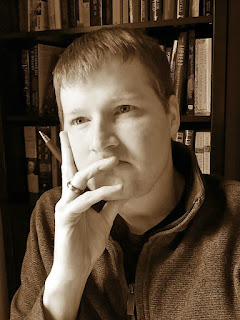England, AD 1471. Henry Tudor's drop of royal blood had never mattered, considering the scores of noblemen with stronger claims to the throne. But when Edward IV becomes king during the Wars of the Roses, that drop threatens Henry's life and forces him into exile.
I'm pleased to welcome author K.M. Butler to The Writing Desk:
The Welsh Dragon follows Henry Tudor during his 14-year exile prior to winning the English crown at Bosworth. Not only were his political enemies working tirelessly to retrieve and execute him—they nearly succeeded more than once—but he was also a young man struggling to establish an identity. He had to grow up in an unfamiliar court as a prisoner-guest without his birthright, his family, or his home. This was an uncertain time for Henry, but it shaped him into the man who could end the Wars of the Roses—for both good and ill.
What is your preferred writing routine?
All of my novels begin with some curious point in history. For The Welsh Dragon, it was a question: what would enduring an exile at such a young age do to a person? From there, I extensively research, then outline. My scene guide was 23-pages, single-spaced! In it, I detail not only plot points, but character development and implications for future scenes. Once I start writing, I aim for finishing just one scene a week. At that pace, I have time to percolate on what’s going to happen next so my writing time is spent doing, rather than redoing.
What advice do you have for new writers?
Share your work with other writers and beta-readers. The key is to approach feedback from the perspective that your reader is right. Their criticism is legitimate and deserves serious consideration. I’ve been writing for 20 years, but I only began to improve after aggressively sharing my work with others and applying their feedback.
What have you found to be the best way to raise awareness of your books?
I don’t think anyone has gotten it quite right. I’ve found that participating on blogs and podcasts helps, as does sharing copies for ARC reviews. Folks like to know what they’re in for, and word-of-mouth is a powerful tool.
Tell us something unexpected you discovered during your research
While fiction is filled with daring ventures and thrilling escapes, you never really expect them to have actually happened. However, Henry Tudor really did have some exciting moments. To avoid being repatriated by Edward IV, he really did break away from his captors and flee into St. Malo, and the priest did lead the citizens in a defense. When he finally escaped to France, his pursuers were about an hour behind him. On a journey that would have lasted several days, that’s incredibly close. Those are the kinds of details a writer loves! The scenes basically write themselves!
What was the hardest scene you remember writing?
Emotional turning points take a lot of time to get right. I really struggled with the scene when Henry returns from attempting to join Buckingham’s revolt in 1483. It called for anguish, since his dreams came crashing down. Getting the reactions of all the characters just right took a lot of percolating and re-writing.
What are you planning to write next?
Next, I’ll be publishing a novel set in Medieval Venice about vendettas, family discord, and conspiracy. I’m also revising a novel set during the Spanish Reconquista about a Mozarab thief and a Muslim qiyan who journey into El Cid’s Valencia to steal a precious book. But next to be written is a biographical novel exploring the motivations of Gaius Cassius Longinus, the man who engineered Caesar’s assassination. History has been pretty brutal to him, but his is a story about a man fighting against the ruin of everything his people ever believed in. There’s a tension there worth exploring.
K.M. Butler
Tell us something unexpected you discovered during your research
While fiction is filled with daring ventures and thrilling escapes, you never really expect them to have actually happened. However, Henry Tudor really did have some exciting moments. To avoid being repatriated by Edward IV, he really did break away from his captors and flee into St. Malo, and the priest did lead the citizens in a defense. When he finally escaped to France, his pursuers were about an hour behind him. On a journey that would have lasted several days, that’s incredibly close. Those are the kinds of details a writer loves! The scenes basically write themselves!
What was the hardest scene you remember writing?
Emotional turning points take a lot of time to get right. I really struggled with the scene when Henry returns from attempting to join Buckingham’s revolt in 1483. It called for anguish, since his dreams came crashing down. Getting the reactions of all the characters just right took a lot of percolating and re-writing.
What are you planning to write next?
Next, I’ll be publishing a novel set in Medieval Venice about vendettas, family discord, and conspiracy. I’m also revising a novel set during the Spanish Reconquista about a Mozarab thief and a Muslim qiyan who journey into El Cid’s Valencia to steal a precious book. But next to be written is a biographical novel exploring the motivations of Gaius Cassius Longinus, the man who engineered Caesar’s assassination. History has been pretty brutal to him, but his is a story about a man fighting against the ruin of everything his people ever believed in. There’s a tension there worth exploring.
K.M. Butler
# # #
About the Author
K.M. Butler studied literature at Carnegie Mellon University and has always had an avid interest in history. His writing influences are The Lions of al-Rassan by Guy Gavriel Kay and Colleen McCullough’s Masters of Rome series. He lives in Philadelphia with his wife and two daughters. His wife is his first and harshest editor, while his daughters always want his stories to feature more blood and talking animals, but never at the same time. Find out more at his website https://kmbutlerauthor.wordpress.com/ and find him on Twitter @kmbutlerauthor



No comments:
Post a Comment
Thank you for commenting